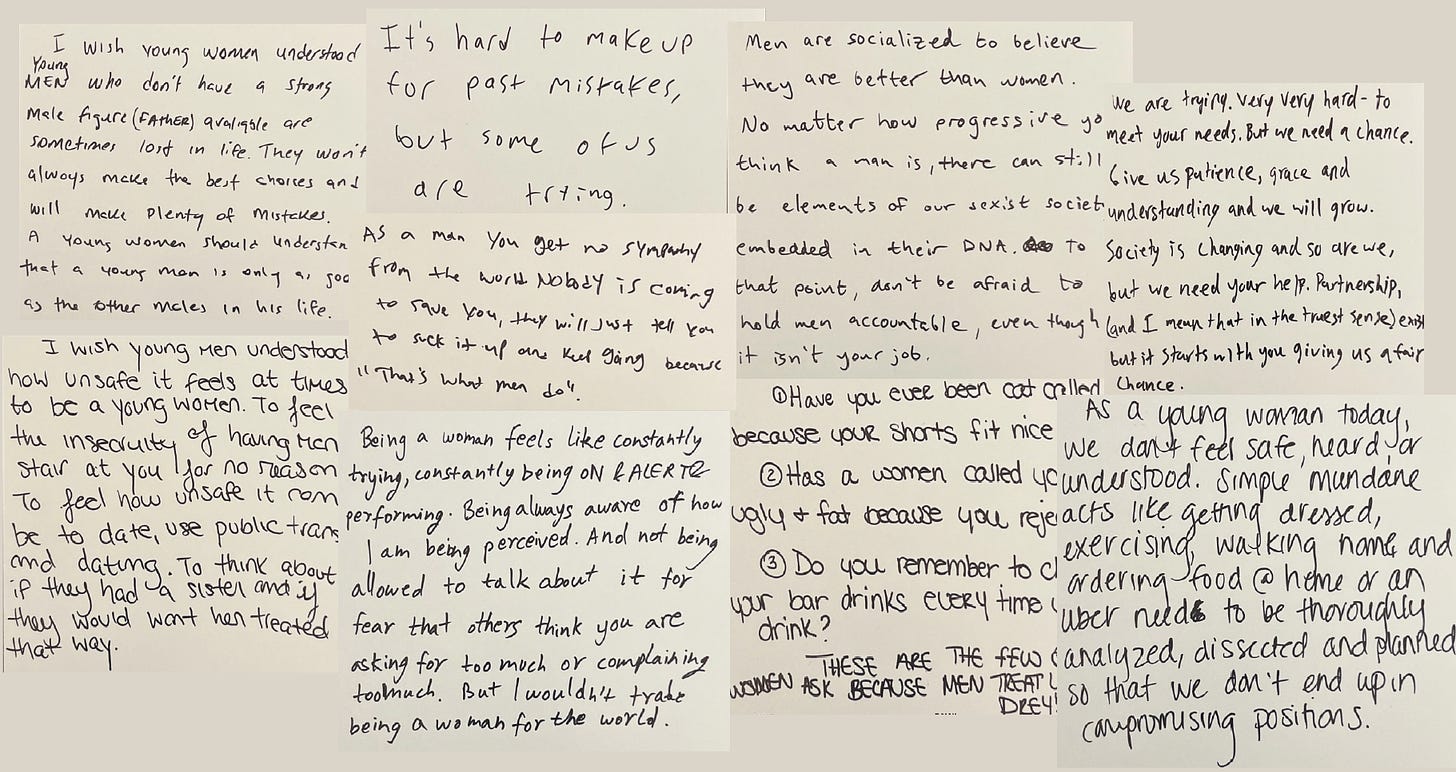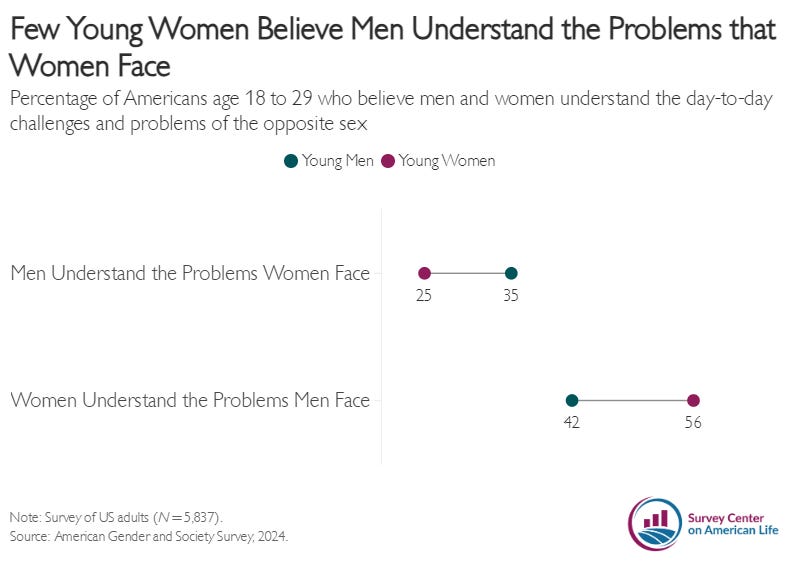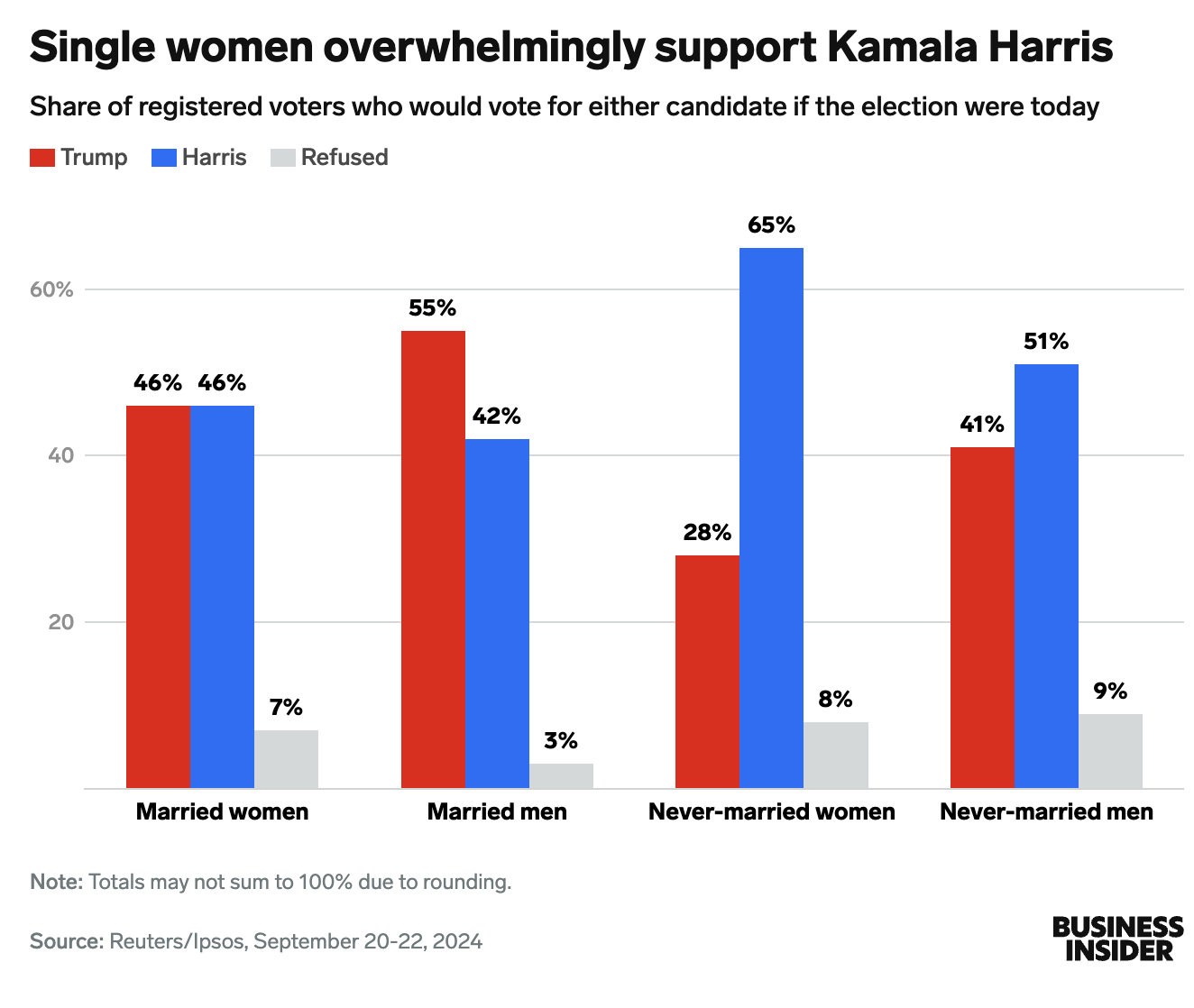Newsletter October 17, 2024
“We Don’t Feel Safe, Heard, or Understood.”

A few weeks ago, I went to Philadelphia, PA to conduct a series of focus groups with young men and women. We discussed a variety of subjects including dating, relationships, infidelity, pornography and the 2024 U.S. election. As part of this research, we teamed up with The Washington Post to give participants the opportunity to share their feelings about the conversation. At the conclusion of each session, we handed each participant a postcard with the following question: “The Post wants to know: What do you wish young men/women understood about what it’s like to be a young woman/man today? Share your thoughts and they might be published as a Letter to the Editor.”
The Post published the postcards in a Letters to the Editor in early October. It struck a chord with readers, generating nearly 1,300 comments. I would encourage you to check it out, especially the commentary. I also wanted to share a more complete list of the responses we received.
What the Men Wrote…
Many men wrote about feeling lost or alone. They expressed being misunderstood, unable to meet and keep up with the changing standards they are held to. And if they fall or if they fail, no one is coming to save them.
“I wish young women understood young men who don’t have a strong male figure (father) available are sometimes lost in life. They won’t always make the best choices and will make plenty of mistakes. A young women should understand that a young man is only as good as the other males in his life.”
— Adeniyi, Age 31
“Men are socialized to believe they are better than women. No matter how progressive you think a man is, there can still be elements of our sexist society embedded in their DNA. To that point, don’t be afraid to hold men accountable, even though it isn’t your job.”
— Andrew, Age 23
“We are trying. Very very hard – to meet your needs. But we need a chance. Give us patience, grace and understanding, and we will grow. Society is changing and so are we, but we need your help. Partnership (and I mean that in the truest sense) exists but it starts with you giving us a fair chance.”
— Bret, Age 29
“The narrative you’ve been fed – that men are a privileged class and women their victims – is backwards. In truth, that narrative is itself an example of the disadvantages men face. Further examples include: The expectation men will provide and protect women for free. The greater difficulty and danger of men’s work. The far greater difficulty finding a partner. The culture of misandry which defines modern society”
— Dennis, Age 23
“As a man you get no sympathy from the world. Nobody is coming to save you, they will just tell you to suck it up and keep going because ‘that’s what men do.’”
— Danny, Age 31
“It’s hard to make up for past mistakes, but some of us are trying.”
— Jake, Age 25

What the Women Wrote…
Many women expressed concerns about their personal safety. They spoke of the fear they live with every day, even when performing the most mundane tasks. But the distress many women felt was fused with anger and frustration with men for being oblivious to the problem.
“Being a woman feels like constantly trying, constantly being on and alert and performing. Being always aware of how I am being perceived. And not being allowed to talk about it for fear that others think you are asking for too much or complaining too much. But I wouldn’t trade being a woman for the world.”
— Tanaya, Age 29
“As a young woman today, we don’t feel safe, heard, or understood. Simple mundane acts like getting dressed, exercising, walking home, and ordering food at home or an uber need to be thoroughly analyzed, dissected and planned so that we don’t end up in compromising situations.”
— Melissa, 32
“1. Have you ever been cat called because your shorts fit nice?
2. Has a women called you ugly and fat because you reject her?
3. Do you remember to check your drinks every time you drink?
THESE ARE THE FEW QUESTIONS WOMEN ASK BECAUSE MEN TREAT US LIKE PREY!”
— Tira, Age 26
“I wish young men understood how unsafe it feels at times to be a young woman. To feel the insecurity of having men stare at you for no reason. To feel how unsafe it can be to date, use public transportation and dating. To think about if they had a sister and if they would want her treated that way.”
— Lia, Age 26
During the focus groups, there were multiple times when I wished that our men’s groups had the opportunity to listen to the conversations women were having together. Likewise, it would have been great if the women we talked to could hear not only what the men were saying, but how they were saying it.
In a recent survey, we asked young men how well they thought women understood the problems they faced in American society. We posed the same question to young women. Women were generally more confident that they knew what men dealt with than men themselves. Fifty-six percent of young women said that women understood at least somewhat well what men went through, while less than half (42 percent) of young men agreed. When it came to how well men understood the challenges women faced, both young men and women agreed that many men did not have a clue. Only about one in four young women (25 percent) and just over one in three (35 percent) young men said that men understand even somewhat well what women dealing with on daily basis.

I have no trouble believing that women have a broader base of knowledge about men than men have about women. Women are socialized to be more empathetic, are generally more practiced active listeners, and are more interested in stories written by men or about men, all of which gives women greater insight into male behavior and motivations. Historically, men have demonstrated less interest in learning about the problems and perspectives of women. It’s a problem that is still evident in reading preferences today. A report by Deloitte found:
“Of the 10 bestselling male authors, readership was roughly evenly divided by gender, with 55% male readers and 45% female readers. In contrast, only 19% of the 10 bestselling female authors’ readers were male, compared to 81% female.”
This same behavior plays out in other ways too. A while ago I heard a story about a high school English teacher who assigned his students to write about a day in the life of someone of the opposite gender. The boys had to imagine what the experience of being a high school girl was like, while the girls had to share their thoughts about what life was like as a boy. The girls threw themselves at the assignment, drafting detailed and thoughtful essays, but many of the boys refused to do it all. The few male students who took up the assignment did so grudgingly.
I’m not in the least bit surprised by this behavior. Fears about being perceived as feminine still govern male adolescent behavior. Many young men will go out of their way to avoid engaging in activities that are perceived as feminine. Why does this happen in 2024? It’s not necessarily that men are trying to avoid being bullied by their male peers, although that may play a role. Most young men believe their chances with the opposite sex are far better if they are viewed as masculine. A new survey we conducted found that a majority (55 percent) of young men agreed with the statement: “Straight or heterosexual men who are not very masculine generally have a harder time attracting women.” Nearly half (45 percent) of young women agreed as well. For young men trying to succeed in the mess that is the modern dating market, this is a strong motivation.
Despite declarations from some of the women in our focus groups that “men are simple creatures,” most men have complex emotional lives. They’ve just learned to hide their feelings or ignore them. It’s unfortunate that men are so often portrayed as emotionally immature or unsophisticated. To read news coverage about young men or listen to male-oriented podcasts you would come away with the sense that young men are shallow—they enjoy pranks, sports, video games, pornography and not much else.
These kinds of stereotypes can be seductive because of their simplicity—they serve as ready-made answers to complex questions. But pretending that men are not emotionally sophisticated does not serve them or the women in their lives well. The solution is not to double-down on these superficial characterizations, but to acknowledge that young men and women have distinctive experiences and concerns. For men, it means not only being curious about what women experience and believe, but about themselves as well.
…
Revenge of the Cat Ladies?
If you want some election-focused content, you can check out my recent post at Business Insider that explores the growing political influence of single women voters. In recent elections unmarried women have made up one-quarter of all voters, and they are increasingly supporting Democrats.

Read more on American Storylines








